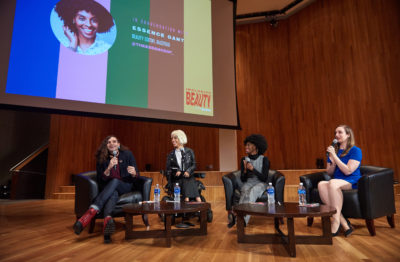
Fall at FIT has ushered in a moment for the college community to recognize and celebrate diversity both in beauty and in body image. What follows is the first of a three-part series covering three events at FIT—a panel titled Inclusive Beauty with BuzzFeed, the School of Business and Technology’s Dean’s Forum called The Business of Curves, and, finally, the opening, in December, of The Body: Fashion and Physique at The Museum at FIT. Each installment of the series will comprise a Q&A with the moderator, the participants, or, in the case of the exhibition, the curator. These Q&As will enhance the topics the programs present.
Inclusive Beauty, held November 6 and organized by Suzanne McGillicuddy, assistant dean of students, addressed beauty standards and how the fashion, beauty, and media industries address diversity and inclusion. A packed house heard discussion by panelists Essence Gant, BuzzFeed’s beauty editor, who focuses on multicultural beauty; Jillian Mercado, an FIT alumna and differently abled model who has starred in campaigns for Nordstrom and Target, as well as editorial features in the September issues of Glamour and Cosmopolitan magazines; Jacob Tobia, a writer, producer, author, performer, visionary, and internet personality who helps others embrace the full complexity of gender and own their truth.
Augusta Falletta, supervising producer of BuzzFeed’s Top Knot, moderated the discussion. Managing a team of seven video producers, she is responsible for developing cross-platform beauty content, coordinating sponsored content with the branded team, and coordinating the global adaptation and expansion of Top Knot content. She is also an FIT alumna.
Newsroom sat down with Falletta to talk about the panel.
Newsroom: Why was it important for BuzzFeed to be part of the Inclusive Beauty conversation?
Falletta: It’s not so much that it’s important to be part of a conversation, per se, but that it’s vital for the beauty conversation to be inherently inclusive, especially in today’s day and age. The beauty industry has excluded entire groups of people from the narrative for years, and those people deserve a seat at the table as much as anyone, so it’s time that the industry pulled up chairs.
Why is it important that FIT students heard what these individuals had to say?
If you only ever hear the same story for your entire life, you’ll never know anything else. FIT students need to be aware of the points of view of other people just as much as they need to feel like their own points of view are valid, too. They can be the innovators to drive new conversations in beauty, create new products, and market in new ways to bigger audiences. But to do all of that, they need to listen to people who’ve been excluded from the conversation for so long.
As the moderator, how did you decide which topics were most important to surface for the panel?
The panelists at Inclusive Beauty are all interesting, experienced individuals with a strong vision for what they believe the beauty industry needs when it comes to inclusivity. I hoped to simply make the panelists feel seen and heard so that they were comfortable to share openly about their experiences in the beauty industry regarding gender, race, ability, and sex as they relate to beauty in the digital age.
What, in your opinion, was the most important take-away from the panel?
We’ve come a long way in the beauty industry. We’re much more representative of marginalized groups and we’re starting to have tougher conversations around what inclusivity really means—as opposed to claiming inclusivity by simply “checking a box.” That being said, we’ve got a long road ahead of us. Companies need to hire and promote more diverse employees so that the decisions being made for all aren’t being made only by some; brands need to work with a more diverse range of people when coming up with products and campaigns for the same reason. The power dynamic in beauty needs to shift away from one small group of stakeholders if we’re really going to change the landscape.
